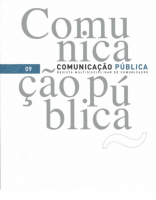Cyber-militancy
is the Internet a key element for contemporary social movements?
DOI:
https://doi.org/10.4000/cp.7676Keywords:
movements, media, militancy, identities, globalizationAbstract
The aim of this study is to examine the impact of a media, Internet, in our current societies throughout the description and the analysis of the importance of the latter in contemporary social movements. If Internet is today a central element for political activism and identitary recognition among numerous movements, nevertheless, it is not a panacea. Indeed, it presents some limits: It cannot solve all social movements problems, it is not a substitute for their classical and «material» actions, and more, it generates new paradoxes.
Downloads
References
Clark, J. (2003) Worlds Apart: Civil Society and the Battle for Ethical Globalization. Bloomfield CT, Kumarian Press.
Cullen, P. (2005) Conflict and cooperation within the platform of european social NGOs. In Bandy, J. e Smith, J. eds Coalitions Across Borders: Transnational Protest and the Neoliberal Order. Maryland, Rowman & Littlefield Publishers Inc., pp.71-94
Hesse, M. (2009) Causas políticas no Facebook e no Twitter. Activismo num simples clique na Net acontece e logo desaparece. Público, 4 Julho, p.15.
Masse, C. (2007) Les Organisations non Gouvernementales face aux Gouvernants. Les Rapports Majeurs des ONG avec l’ONU, la Banque Mondiale et la Commission Européenne. Paris, Editions Le Manuscrit.
Masse, C. (2005) El papel de las organizaciones no gubernamentales en los «Paises del Sur»: El caso de una ONG de desarrollo española en América Central. In: Bretón Solo de Zaldívar, V. e López Bargados, A. eds. Las ONGS en la Reflexión Antropológica sobre el Desarrollo y Viceversa. Perspectivas Africanas y Latinoamericanas. Sevilla, FAAEE, Fundación El Monte, Asana, pp. 39-51.
Mayo, M. (2006) Global Citizens: Social Movements and the Challenge of Globalization. Londres, Nova Iorque, Zed Books/Toronto, CSPI.
McLuhan, M. (1968) Pour Comprendre les Médias. Paris, Seuil.
Meiksins Wood, E. (1996) Modernity, postmodernity, or capitalism? Monthly Review, Julho-Agosto, pp. 21-39. DOI : 10.14452/MR-048-03-1996-07_2 good / bad
Minkoff, D. (1997) Producing social capital: National social movements and civil society. American Behavioral Scientist, 40 (5), pp. 606-619.
Morris-Suzuki, T. (2000) For and against NGOs. The politics of the lived world. New Left Review, 2, Março-Abril, pp. 63-84.
Olaseinde Arigbede, M. (2004) Composing a New Song: Stories of Empowerment from Africa. Londres, Avondale, Kampala, Commonwealth Foundation, Weaver Press, Fountain Publishers.
Popple, K. e Shaw, M. (1997) Social movements: Re-asserting «community». Community Development Journal, vol. 32, n.º 3, Julho, pp. 191-198.
Putnam, R. (1995) Bowling alone: America’s declining social capital. Journal of Democracy, 6 (1), pp. 65-78. DOI : 10.1353/jod.1995.0002 good / bad
Putnam, R. (1993) Making Democracy Work: Civic Traditions in Modern Italy. Princeton, NJ, Princeton University Press.
Schuler, D. e Day, P. eds (2004) Shaping the Network Society. The New Role of Civil Society in Cyberspace. Cambridge, Londres, The MIT Press.
Smith, J. (1998) Global civil society? Transnational social movement organizations and social capital. American Behavioral Scientist, vol. 42, n.º1, Setembro, pp.93-107.
Tocqueville, C. (1951 [1835 e 1840]) De la Démocratie en Amérique. Paris, Gallimard.
Downloads
Published
Issue
Section
License
Copyright (c) 2010 Direitos do Autor (c) 2010

This work is licensed under a Creative Commons Attribution-NonCommercial 4.0 International License.
Os conteúdos da Comunicação Pública estão licenciados com uma licença Creative Commons - Atribuição-NãoComercial 4.0 Internacional.


